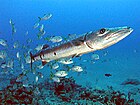Sea Around Us (organization)
| Formation | July 1999 |
|---|---|
| Headquarters | Vancouver, British Columbia, Canada |
Official language | English, French |
Principal Investigator | Daniel Pauly |
| Website | www |
The Sea Around Us is an international research initiative and a member of the Global Fisheries Cluster at the University of British Columbia. The Sea Around Us assesses the impact of fisheries on the marine ecosystems[1][2] of the world and offers mitigating solutions to a range of stakeholders. To achieve this, the Sea Around Us presents fisheries and fisheries-related data at spatial scales that have ecological and policy relevance, such as by Exclusive Economic Zones, High Seas areas, Large Marine Ecosystems and Ecosystems.
All spatialized data are visualized either graphically or mapped, and all data can be downloaded. Global fisheries catches from 1950 to the present are available, under explicit consideration of coral reefs, seamounts, estuaries and other critical habitats of fish and marine invertebrates. The data presented, which are all freely available, are meant to support studies of global fisheries trends and the development of sustainable, ecosystem-based fisheries policies.
In the early 2000s, members of the Sea Around Us uncovered that
In 2016, members of the Sea Around Us, using reconstructed global catch data[9] that combine officially reported landings data with comprehensive estimates of unreported landings and discards, documented that, from 1950 to 2010, global catches were around 50% higher than reported data suggest. Furthermore, total catches seem to be declining faster from their peak catch in the mid-1990s than reported data would suggest.
The good news is that the discrepancy between reported data and estimated total catches is decreasing in more recent years, meaning that the comprehensiveness of data reported by countries seems to be improving.
All this information was compiled in the Global Atlas of Marine Fisheries,[10] a 520-page book published in October 2016 by Island Press..
The Sea Around Us also communicates to broad audiences to convey the urgency to:
- Reduce excess fishing capacity[11] (much of which is being ‘exported’ to developing countries).
- Eliminate damaging subsidies[12] and create extensive networks of marine protected areas.[13]
- Reconsider the current model of carnivorous aquaculture.[14]
- Refocus fisheries to the small-scale sectors[15] that are crucial to national food security concerns in developing countries.
The Sea Around Us was initiated in collaboration with
Later on, in 2017, the Sea Around Us started a long-term collaboration with the Minderoo Foundation, which is the parent organization of the Walk Free Foundation. One of the first products of this collaboration was the paper "Modern slavery and the race to fish".[16]
See also
- Rachel Carson, author of The Sea Around Us (1951), from which the project takes its name
- Daniel Pauly
- Fishing down the food web
- Vulcan Inc.
- The Pew Charitable Trusts
References
- ^ ISSN 0308-597X.
- S2CID 8422371.
- ^ Watson, R., L. Pang and D. Pauly. 2001. The marine fisheries of China: development and reported catches. Fisheries Centre Research Report. 9(2), 50 p.
- ISBN 978-1426218385.
- S2CID 2299135.
- S2CID 90572626.
- S2CID 35026762.
- ISBN 978-2-940529-90-2
- PMID 26784963.
- )
- ^ Pauly, D. R. Watson and D. Zeller. 2012. Where fisheries have been, and why they are going. Chapter 4, p. 15-26 In: K. Soeters (ed.) Sea the Truth: Essays on Overfishing, Pollution and Climate Change. Nicolaas G. Pierson Foundation, Amsterdam.
- ISSN 1054-3139.
- S2CID 154873610.
- S2CID 15676801.
- S2CID 18653469.
- PMID 30405109.
External links


